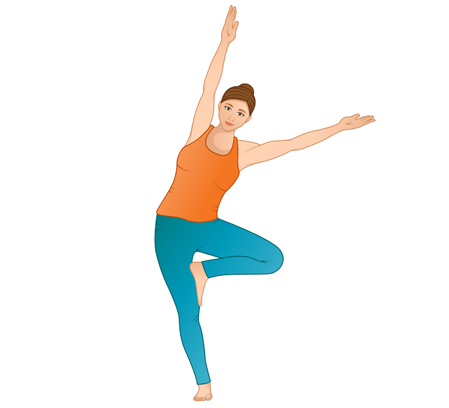Bending Tree Pose
Vrksasana

STEPS
The Bending Tree Pose is a variation of the classic Tree Pose or Vrksasana. The classic pose is a standing posture which is an easy pose for beginner Yoga students. The bending tree pose can be attempted by beginner students, with the support of the wall. However, this pose is ideal for the intermediate or advanced practitioners, as they can experience the full range of motion while in this pose.
Much like the tree pose, this bending variation helps achieve balance, strength and steadiness.
To practice the bending tree pose, begin in Mountain Pose. Ensure both the feet are planted firmly on the ground. Lift the left leg off the ground slightly to balance yourself only on the right foot. Focus specifically on anchoring the big toe, little toe and the ball of the right foot firmly into the mat. Slowly lift the left foot with your right hand and place the foot on the inside of the right thigh. Be careful not to place the foot lower or directly on the knee. Staying balanced on the right foot and with the left foot firmly placed on the inner right thigh, raise the right arm over and above the head to stretch and lengthen the right side of the torso. Rest the left arm on the left thigh. A good guide here to maintain your balance is to find a yogic point of gaze or ‘dristi’ in front of you. This will help keep the focus and balance. Once anchored in this position, stretch laterally to the left side, to further lengthen and stretch the right side. Stay in the pose while breathing deeply for 3 – 5 breaths. To come out of the pose, bring the extended right arm back down and release the left foot back to the ground to return to Mountain Pose.
Repeat the same steps on the other side by balancing on the left foot.
TEACHER QUEUES
VISUALIZATION COMMENTS
The most important cue for visualisation in this pose is to imagine the foot that is balancing anchoring into the ground. Another strong cue to visualise is to ask your students to imagine roots from their foot grounding them as their strong legs are the trunk of a tree, while their arms are the branches with leaves extending towards the sky. While bending imagine the tree swaying in the wind, but staying strong and balanced.
TECHNICAL COMMENTS
Start by balancing on one foot by lifting the other foot a few inches of the mat. Sometimes a light swinging of the leg that is lifted will help in orienting the body with balancing on one foot. Avoid locking the knee while trying to balance on one foot. Bring awareness to the muscles in the foot while balancing. It is important to ensure that the foot that is placed on the upper thigh should have the toes pointing down towards the mat. Also, the foot should be directly under the centre of the pelvis.
BENEFIT COMMENTS
- Helps in reliving Sciatica
- Strengthens the ankles, thighs and calf muscle.
- Strengthens the spine
- Helps improve balance and coordination
- Helps those with flat feet
- Increases alertness and concentration
WATCH OUT FOR
- Placing the foot on the side of the knee
- Placing the foot on the calf muscle.
- Loss of balance while standing on one foot
CONTRAINDICATIONS
- Weak knees
- Ankle injuries
- Slip disk
- Back injury
- Arthritis
- Vertigo
MODIFICATIONS
- Use a strap wrapped around the foot to ensure the foot does not slip
- Using the wall as support to balance
VARIATIONS
- Stretch both arms above for a challenging bending tree pose
- Bring both palms together to elongate torso completely.
- Bringing both hands in front of the chest in the Namaste mudra
YOGA COUNTER POSES
Written By: Adithi Mathews
Adithi Mathews is a 500 Hr CYT,yoga practitioner and writer living in Germany. More information can be found on www.adithimathews.com



